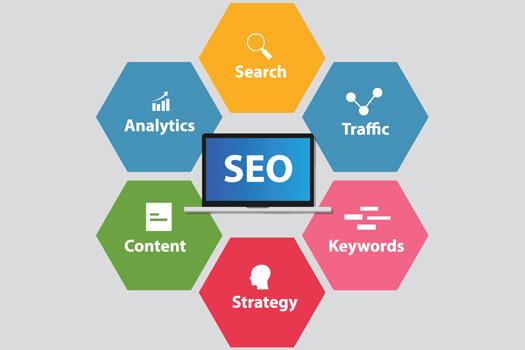Table of Contents
- Understanding the Domain Market and Its Potential
- Strategies for Attracting Buyers to Your Domain Listings
- Crafting Compelling Domain Descriptions for Maximum Impact
- Utilizing SEO Techniques to Enhance Domain Visibility
- Navigating Legal Considerations in Domain Selling
- Q&A
- The Way Forward
Understanding the Domain Market and Its Potential
The domain market represents a dynamic and rapidly evolving landscape that can yield significant opportunities for website owners and investors alike. With the ever-increasing digital presence of businesses and individuals, the demand for appealing, memorable, and keyword-rich domain names continues to skyrocket. This demand creates a potential goldmine for those willing to navigate this viable market effectively. As a seller, understanding the various factors that influence domain valuation—such as length, branding potential, and relevance—can set the foundation for successful transactions.
When diving into this market, there are several key characteristics to consider that can drive value:
- Keyword Relevance: Domains containing popular keywords can attract more traffic and increase their worth.
- Brandability: A catchy and unique name helps ensure that your domain stands out, facilitating easier recall by potential visitors.
- Market Trends: Staying attuned to industry trends can enhance buying and selling strategies, allowing you to capitalize on emerging niches.
- Length and Simplicity: Shorter domains are often more valuable due to their ease of use and memorability.
Furthermore, leveraging effective marketing strategies can significantly boost your success in the domain space. Consider establishing a platform that not only showcases available domains but also educates potential buyers about the value of investing in premium names. Utilizing SEO techniques, social media marketing, and email campaigns can extend your reach and attract interested parties. Below is a simplified overview of methods to enhance your domain selling endeavors:
| Method | Description |
|---|---|
| Search Engine Optimization | Optimize your listings for search engines to improve visibility and attract organic traffic. |
| Social Media Promotion | Share your domains on platforms like Twitter, LinkedIn, and Facebook to reach a broader audience. |
| Email Marketing | Send newsletters to potential buyers highlighting attractive domain options and deals. |


Strategies for Attracting Buyers to Your Domain Listings
Attracting buyers to your domain listings requires a well-thought-out approach that focuses on visibility and appeal. Start by creating high-quality listings that clearly communicate the value of each domain. Use engaging descriptions that highlight the potential uses and benefits of the domain, such as brandability, SEO potential, or industry relevance. Quality images or a modern logo can also enhance listings, making them more attractive to prospective buyers. Ensure that your listings are easy to navigate and visually appealing to encourage longer browsing sessions.
Effective marketing strategies can significantly increase your reach. Consider leveraging social media platforms to showcase your domains. Share engaging content, including tips, success stories, and promotional offers. Use targeted ads to reach an audience that aligns with your domain’s niche. Additionally, engaging with communities related to your target audience, such as forums or Facebook groups, can help you get your domains in front of interested buyers. Valuable content, like blog posts or web articles discussing trends, can also position you as an authority while driving traffic to your site.
Another powerful method to attract buyers is to optimize your listings for search engines. Conduct keyword research to identify popular search terms that potential buyers might use. Incorporate these keywords into your domain descriptions and meta tags to improve discoverability. Additionally, consider listing domains on reputable marketplaces where buyers frequently search. Here’s a simple table showcasing some effective domain listing platforms:
| Platform | Features | Audience |
|---|---|---|
| NameCheap | Easy listing, domain auctions | Web developers, small businesses |
| GoDaddy | Wide reach, value estimation tools | Businesses, entrepreneurs |
| Sedo | Marketplace for premium domains | Investors, online sellers |


Crafting Compelling Domain Descriptions for Maximum Impact
When promoting your domains, it’s essential to create descriptions that not only inform but also engage potential buyers. A well-crafted domain description should clearly articulate the unique features and benefits of the domain. Start by highlighting the key attributes that set it apart. This could include factors such as domain length, keyword relevance, and potential industry use, which will help buyers visualize its value:
- Memorable and Short: Easy to recall, ideal for branding.
- Keyword Rich: Contains important search terms to enhance SEO.
- Industry-Specific: Tailored for a niche market, attracting targeted traffic.
Next, include persuasive language to create urgency and desire. You want buyers to feel that they can’t miss out on owning such a valuable asset. Phrases like, “This domain is perfect for your startup,” or “Unlock your potential with a unique online identity,” can spark interest. Furthermore, consider adding a short table that compares similar domains or highlights performance metrics to showcase why your domain is the best option available:
| Domain | Length | Key Benefit |
|---|---|---|
| example1.com | 9 characters | Great for branding |
| example2.com | 11 characters | Keyword optimized |
| example3.com | 10 characters | Industry-specific |
Lastly, connect with your audience by addressing their needs and aspirations. Explain how the domain can serve their goals, whether it’s for an e-commerce site, a personal blog, or a business venture. Including a strong call to action can prompt immediate engagement, such as “Secure this domain now to take your online presence to the next level!” This approach not only informs but also incites action, making your domain offerings irresistible.


Utilizing SEO Techniques to Enhance Domain Visibility
To increase the visibility of your domain sales website, it is crucial to implement effective SEO techniques that ensure your site ranks higher in search engine results. One of the foundational steps involves conducting thorough keyword research. Identify terms and phrases potential customers might use when looking to buy or sell domains. Tools like Google Keyword Planner or Ubersuggest can help you pinpoint popular keywords in your niche, allowing you to optimize your content accordingly. This strategic approach will lead to enhanced organic traffic and visibility.
Next, consider the importance of on-page SEO elements, such as title tags, meta descriptions, and header tags. Optimizing these elements with targeted keywords not only informs search engines about your page’s content but also intrigues users to click through to your listings. Keep your title tags compelling but concise, while your meta descriptions should summarize the benefits of your services clearly. Utilize header tags (H1, H2, H3) to structure your content, making it easier for users to navigate your site and for search engines to index your pages effectively.
Lastly, backlinks play a crucial role in enhancing your site’s authority and visibility. Creating high-quality content that attracts links naturally is vital. Share unique insights about domain investing or market trends on your blog, and participate in discussions within relevant forums or social media platforms. You might also consider reaching out to related businesses or influencers for guest posting opportunities. An understanding of social sharing can also amplify your reach; encourage readers to share your content and listings on social networks, thus increasing the chances of acquiring quality backlinks.


Navigating Legal Considerations in Domain Selling
When engaging in the domain selling process, it is crucial to familiarize yourself with legal aspects that can impact your transactions. Understanding intellectual property rights is fundamental, as these rights protect your domain name from infringement and unauthorized use. Certificates of registration may help establish the legitimacy of your ownership, but it’s equally important to check for existing trademarks or similar names that could lead to potential legal disputes. Ensuring that your domain does not violate any trademark can save you from costly litigation and reputation damage.
Another significant consideration involves the terms of service from your domain registrar or marketplace. Different platforms have unique regulations regarding domain transfers, sales, and ownership claims. Prior to listing your domain for sale, make sure to review and understand the following elements:
- Transfer Policies: Know how the transfer process works and any requirements needed for completion.
- Fee Structures: Be aware of any fees associated with listing and selling your domain.
- Dispute Resolution: Understand the procedures in place if a dispute arises during the sale.
Additionally, creating a detailed and legally sound sales agreement is essential for both parties involved in the transaction. This agreement should outline the terms of the sale, including payment methods, timelines, and conditions for transfer. Consider using a template that includes the following sections:
| Section | Description |
|---|---|
| Parties Involved | Name the buyer and seller, including contact information. |
| Domain Details | Include the exact domain name and any associated intellectual property. |
| Payment Terms | Specify the amount, payment method, and timeline. |
| Transfer Process | Outline how the transfer will occur, including necessary approvals. |
Exploring these legal considerations not only protects you but also builds a more trustworthy environment for potential buyers. By being proactive about understanding the laws governing domain sales, you can navigate the complexities with confidence and facilitate successful transactions.
Q&A
Q&A: Selling Domains on Your Website
Q1: What does it mean to sell domains on my website? A: Selling domains on your website means offering domain names for purchase through your own online platform. This can be part of a larger business strategy, where you act as a domain registrar or simply curate a selection of domain names that you own and want to sell to interested buyers.Q2: How can I choose the right domain names to sell? A: Selecting the right domain names involves a mix of creativity and market research. Aim for names that are short, memorable, and relevant to popular niches or industries. Use keyword research tools to find trending terms, and consider using tools like Google Trends to see what potential buyers are searching for.
Q3: Do I need a special license or registration to sell domains? A: Generally, you do not need a specific license to sell domain names that you own. However, if you are acting as a registrar—where you register domains on behalf of other people—you’ll need to comply with regulations and possibly obtain an accreditation from a relevant authority, such as ICANN.
Q4: What platform should I use to sell domains on my website? A: You can use various platforms, depending on your technical expertise and budget. Popular options include WordPress with a domain selling plugin, or dedicated marketplace solutions like Shopify. If you’re tech-savvy, building a custom solution may also be a viable option.
Q5: How can I market the domains I’m selling? A: Effective marketing strategies include optimizing your website for SEO, utilizing social media, and engaging in email marketing. Consider writing blog content related to domain names and their importance, or hosting webinars on how to choose the right domain. Networking in online communities and forums can also draw potential buyers to your offerings.
Q6: What’s the typical price range for selling domain names? A: Domain prices can vary widely based on factors such as length, keyword relevance, and market demand. Generally, you may find domains priced anywhere from $10 to several thousand dollars. Premium domains—those that are shorter, more brandable, or contain popular keywords—often fetch higher prices.
Q7: What payment methods should I offer for purchasing domains? A: Providing multiple payment options can enhance the buying experience and increase your sales. Common methods include credit/debit cards, PayPal, and cryptocurrency. Ensuring a secure payment process is crucial for building trust with your buyers.
Q8: What should I do if my domain doesn’t sell? A: If your domain isn’t selling, reconsider its market value. You might need to lower the asking price, rebrand or tweak its presentation, or improve your marketing efforts. Additionally, consider leveraging domain marketplaces like GoDaddy Auctions or Sedo to reach a broader audience.
Q9: How do I transfer a domain once it sells? A: The transfer process typically involves unlocking the domain at your registrar, obtaining an authorization code, and providing that to the buyer. The buyer will then initiate the transfer on their end. Make sure to follow the specific procedures set by your domain registrar to ensure a smooth transition.
Q10: Can I sell domains I don’t own? A: No, selling domains that you do not own is illegal and could result in legal consequences. Always ensure you have rightful ownership of any domain you plan to sell, and be cautious of any trademarks or branding issues associated with the names you choose. — This Q&A aims to address common questions and concerns related to selling domains on your website, providing useful insights to prospective domain sellers.

